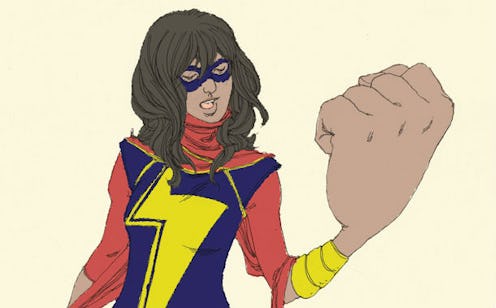
Thanks to some very helpful math, we've now solved the stalwart "mystery" of why the world of comic book superheroes is so awash in white dudes: for no reason whatsoever. Marvel Comics' reboot of the Ms. Marvel series launches Feb. 5 with a Muslim teenage girl from New Jersey and comes as a part of Marvel's "Characters and Creators" initiative aimed at giving women characters the spotlight. And the best part? The results have already proved that the initiative is working.
In an interview with the Washington Post in anticipation of the the new Ms. Marvel's arrival, Characters and Creators editor Jeanine Schaefer says, "There’s this fear that the men who have traditionally been our fan base will stop reading if we bring in new voices. But we’re finding that that’s just not the case." And while it would seem that Schaefer is touching on a note that wreaks of obviousness to some (dudes will like superheroes, no matter their gender), it's one that hasn't been so obvious in comic culture since its outset.
By and large, the number of women employed as superhero comic book writers, artists, and editors is dwarfed by the number of men holding those positions and it's simply always been that way. In fact, once upon a time fellow superhero publishing titan DC Comics' Editorial Policy Code read "the inclusion of females in stories is specifically discouraged. Women, when used in plot structure, should be secondary in importance, and should be drawn realistically, without exaggeration of feminine physical qualities." While that's certainly not the case for contemporary DC or Marvel, both of which employ women and include heroines in their content, there's a clear trail of a boys' club mentality throughout mainstream comics.
And it's a stalwart one at that. In August 2013, the creator of the Spawn comics series, Todd MacFarlane declared superhero comic books a decidedly men-only zone:
I’ve got two daughters, and if I wanted to do something that I thought was emboldened to a female, I probably wouldn’t choose superhero comic books to get that message across. I would do it in either a TV show, a movie, a novel, or a book. It wouldn’t be superheroes because I know that’s heavily testosterone – driven, and it’s a certain kind of group of people. That’s not where I would go get this kind of message, so it might not be the right platform for some of this.
The mentality that superheroes just are the way they are and that no amount of varied interest can change that is not only terribly close-minded, it's a mentality that has colored the genre for eons.
So, Schaefer expressing the fear that fans would balk should Marvel produce comics expressly about women with complex histories and deep characterization without drawing them as the impossibly bodacious babes posing pornographically and bursting out of skimpy outfits isn't quite as obvious as it should be. And that's why the introduction of this new Ms. Marvel is so entirely exciting.
The first book in the new pro-women series, an all-female X-Men title, was the top selling Marvel property in its first month, dispelling the seemingly absurd idea that a Marvel comic book bereft of overwrought testosterone is incapable of capturing a co-ed audience.
And now — or on Feb. 5, rather — the spotlight is shifting to one young woman who, like Spider-Man and Peter Parker, is a gawky young teen turned extraordinary, creating the chance for a shift in mainstream, superhero comic books that — if we're lucky — might some day mean more well-written, well-rounded, and well-represented female superheroes on the page and on the screen, too.
Images: Marvel (2)